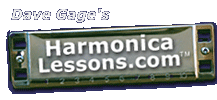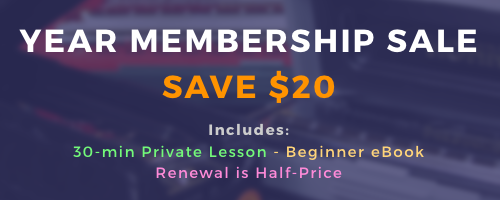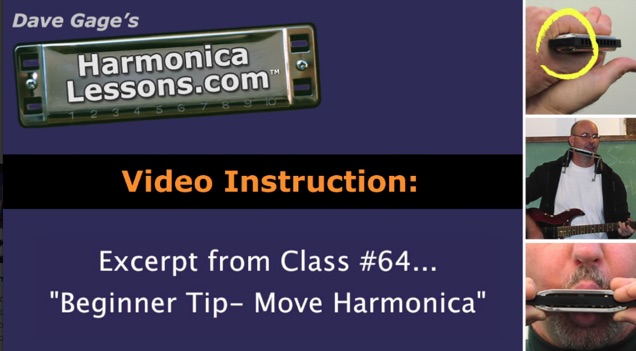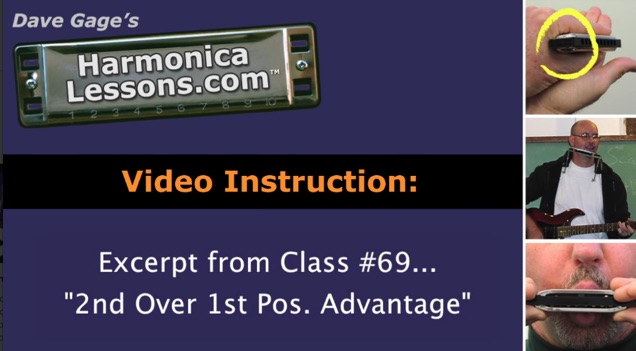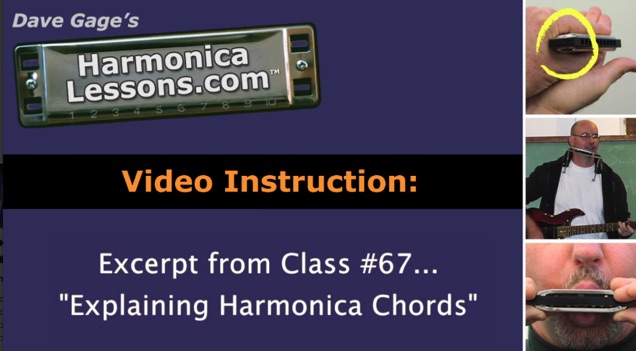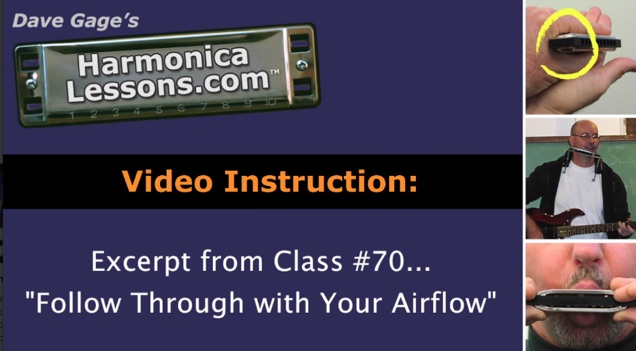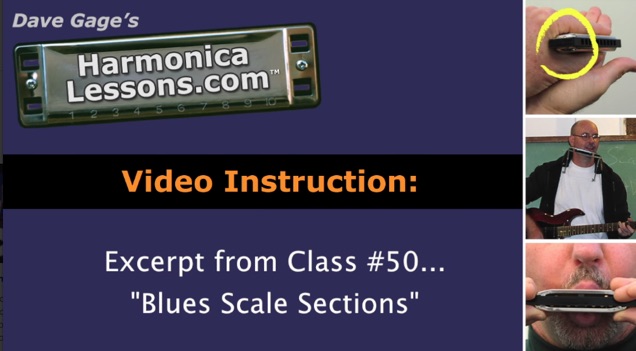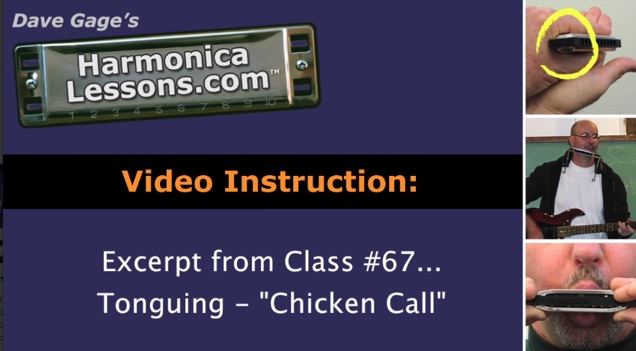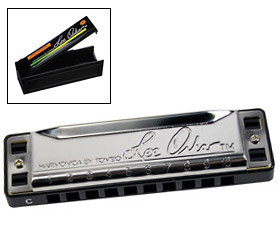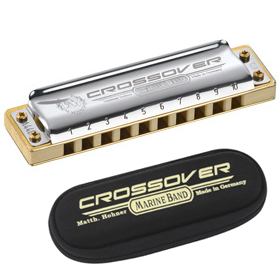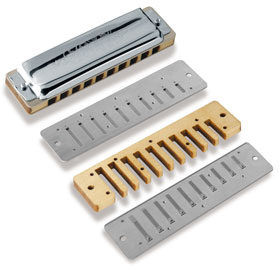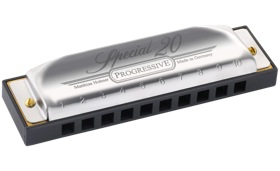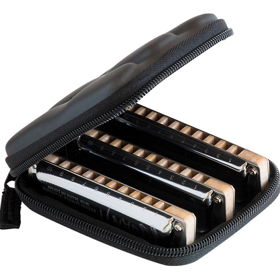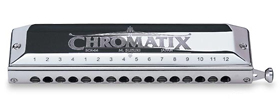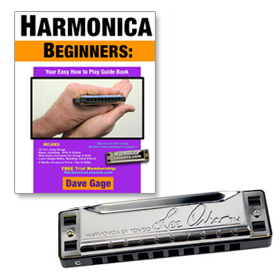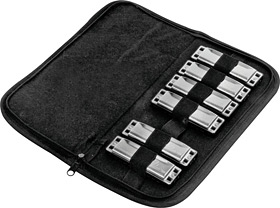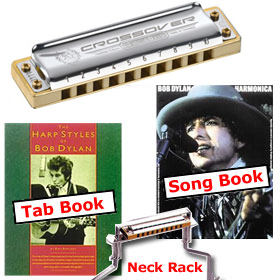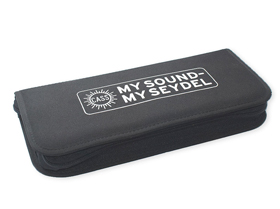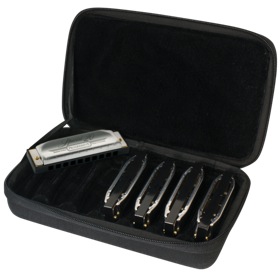FAQs: Beginner Questions
Here is a collection of Frequently Asked Questions (FAQ's) that will help if you're just getting started. Take a look, you are likely to find your question(s) answered on this page or one of the blue-linked pages above.
- Can anyone learn to play harmonica?
- Which harmonica (brand) should I buy to follow the lessons on this site?
- What kind of harmonicas won't work for the lessons on this site?
- Do I need to be able to read music to play harmonica?
- Is it ok to hold the harmonica by the ends if I'm just starting out?
- If certain holes don't play correctly like my hole 2 draw (or not at all), how do I know if it is me or the harmonica? Most of the holes seem to work just fine.
- Is it normal for my mouth and hands to get tired after playing for a while?
- How much should I practice?
- Are there any shortcuts to getting good quickly?
- What is the difference between practicing and playing?
- I hear a lot of different opinions on who are the best players or which are the best playing techniques. Who should I listen to?
- I've heard some players soak their harmonicas before they play. Should I do this?
- How do I know if I'm a beginner, intermediate, or advanced player?
- How do I use other key diatonic harmonicas after I learn to play the key of "C" harmonica?
- Why is it that holes 2 draw and 3 blow on my "C" diatonic are the same note, "G"? Wouldn't it be more logical to have an "F" note in hole 2 draw, so you wouldn't have to bend?
- I'm very eager to learn to play the harmonica, but sometimes I get confused when reading instructions or looking at notes. Are there any tips that you could give me?
-
Can anyone, even without a musical background, learn to play harmonica?
Yes.
- Which harmonica (brand) should I buy to follow the lessons on this site?
You'll need a good quality diatonic type harmonica to learn and practice on with hole numbers imprinted above each hole. The standard 10-hole diatonic harmonica is used for most blues, folk, rock, and country styles (of course you would need a standard chromatic harmonica if utilizing our chromatic harmonica instruction).
You can't go wrong with the Lee Oskar Major Diatonic or the Hohner Special 20 (preferably in the key of "C"), both are great for players just starting out.
The Hohner Marine Band Crossover and the Suzuki Manji Diatonic and the Seydel 1847 Classic are also excellent choices, a bit more pricey, but great quality, tone, and playability with a wood comb. (Can't decide? Pick one, and try another when you need to buy different key.) The Lee Oskar harmonicas also feature the 1st Position and 2nd Position keys printed on the ends for easy reference. See our Which Harmonica Do I Need? page for more suggestions and information.
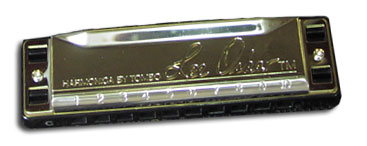
Recommended harmonica: Lee Oskar diatonic in the key of "C".
- What kind of harmonicas won't work for the lessons on this site?
Any harmonica that does not have 10 holes (i.e. 8, 12, or 20 holes) will not work for the lessons on this site. The harmonicas that have two rows of holes, one on top of the other, are generally tremolo harmonicas and will not work for these lessons. Tremolo harmonicas are primarily used for special effects, and they are not made to play blues, bend notes, or play anything other than the most simple 1st position melodies. Chromatic harmonica is the exception, but has it's own section at Harmonica Lessons.com. For Chromatic Instruction, songs, and information, visit the chromatic harmonica portion of this website.
If you have what appears to be a standard diatonic harmonica but it doesn't have any numbers over the holes, it is most likely a very inexpensive one and it would be to your advantage to upgrade to a better quality diatonic (see above question for recommendations). See the Recommended Harmonicas For This Site page for more information.
- Do I need to be able to read music to play harmonica?
No. We mostly use a system for notating harmonica music called tablature or "tabs". See our Tabs section for a detailed explanation.
- Is it ok to hold the harmonica by the ends if I'm just starting out?
Yes. It makes good sense to only work on or concentrate on one thing at a time. If you're memorizing a song or practicing single notes, you don't need to worry about what your hands are doing. Keep it simple, have fun, focus on one thing at a time, and you'll progress more quickly. See the Holding/Hand Effects section for more information.
- If certain holes don't play correctly, like my hole 2 draw (or not at all), how do I know if it is me or the harmonica? Most of the holes seem to work just fine.
98% of the time it is the player. Beginning (and sometimes intermediate players) have a tough time getting a good sound out of 2, 3, 7, 8, and 9 draw holes. This is normally caused by incorrect breathing habits (i.e. sucking the air in from your lips and into your mouth instead of breathing in through the harmonica and continuing that breath through your mouth down to your diaphram). From time to time, you will get a bad harmonica out of the box, but is not as likely with the better brands and models. See our Breathing section for more information and fixes.
- Are there any shortcuts to getting good quickly with the different playing techniques?
Yes and no. Yes, by not getting into bad habits early on that you may have to break later, you will save time in the long run. And no, it's not merely the matter of how much you know and how much you practice, but it takes time for things to really sink in. It is said that to truly master any art form, it takes a minimum of 5-10 years. This doesn't mean that you can't get very good in a shorter amount of time, it just means you will lack the experience that makes the masters really the masters. The longer you play, the more this makes sense.
- Is it normal for my mouth and hands to get tired after playing for a while?
People starting out may find that if they practice or play for more than 10 minutes, their lips and possibly their hands get tired and begin to fatique. This is normal. The best thing to do is to practice for 10 minutes 2 or 3 times a day and build up the associated muscles and your endurance (it won't take too long). Remember, even 5 or 10 minutes a day is better than no minutes.
- How much should I practice?
The simple answer is, as much as possible. The problem is that a lot of us don't have unlimited time in our day to practice as much as we would like. If you want to keep improving you need to practice and play whenever possible. 15 to 30 minutes a day is a good amount of time if you can stick with it.
There are a number of professional musicians that practice an hour or two a day, everyday, and have done so for many years or decades. Do what you can, it will pay off over time. As mentioned above, beginners may find it easier to practice for 10 minutes 2 or 3 times a day and build up endurance (it won't take too long). Remember, even 5 or 10 minutes a day is better than no minutes.
- What is the difference between practicing and playing?
Thinking vs. doing. When you practice, take your time and think about what you're doing so you can build up the correct patterns and muscle memory. When you "play" or perform, you shouldn't be thinking at all. Let the muscle memory you've built up 'do it's thing' and just let it happen. There is an old Zen quote that gets right to the point for all performance situations, "Don't Think, Do".
- I hear a lot of different opinions on who are the best players or which are the best playing techniques. Who should I listen to?
Everyone and no one. Opinions are just opinions. As you play more and increase your experience and knowledge, you will form your own opinions and those are really the only ones that count.
- I've heard some players soak their harmonicas before they play. Should I do this?
No. Soaking ruins wood harmonicas and does nothing for plastic or metal ones. This practice was done decades ago when all that was available was wood harmonicas. The soaking caused the wood to swell up and make the harmonica more airtight and easier to play. These soaked harmonicas didn't last the players very long (and still don't).
- How do I know if I'm a beginner, intermediate, or advanced player?
Ultimately, it doesn't matter as long as you are having fun playing. With that said, it can help on a site like this to know roughly where you stand so that you can choose the appropriate techniques, songs, and information for your skill and knowledge level. You may also want to take a look at the Lesson Plans section.
Beginning Level: anywhere from never having touched a harmonica before, to having put in the equivalent of a few months of practice on basic techniques, songs, and improv.
Intermediate Level: You've been playing regularly for 3-6 months or longer. You should be comfortable (but not necessarily perfect) with the four basic techniques: single notes, hand effects, bending, breathing, and have at least a few songs and riffs memorized. If you haven't already done so, this is the time to start jamming with others.
Advanced Level: You've been playing for a few years or longer. You are familar with most everything on this site, but you still need work in some areas to have the confidence to call yourself a 'pro'.
- How do I use other key diatonic harmonicas after I learn to play the key of "C" harmonica?
The different keyed diatonic harmonicas are all designed to play the same. A key of "G" diatonic will play the same as a key of "C" harmonica (only lower). The correct sharps or flats are added to the different keys to make them play the same. Therefore, your songs and riffs that you learned on the "C", will start and end on the same holes on the other 11 keys of diatonic harmonicas. You don't have to do anything other than to know you are now playing in a different key. If you are playing with other musicians, be sure to let them know what key you are in.
- Why is it that holes 2 draw and 3 blow on my "C" diatonic are the same note, "G"? Wouldn't it be more logical to have an "F" note in hole 2 draw, so you wouldn't need to bend?
First of all, if you never needed to bend on a diatonic harmonica, it would basically be a chromatic harmonica (without use of the button). The bent notes and bending sound is what gives the diatonic it's character.
The duplicate notes on the hole 2 draw and the hole 3 blow allow the player to play both a "C" chord on the blow and a "G" chord on the draw (on a standard key of "C" diatonic). Both of these chords must contain a "G" note to be correct. This goes back to the original design and layout of the diatonic harmonica (called the Richter Tuning), which enables you to play the two most important chords for simple songs of that era (the "C" and "G" chords for the key of "C"). This design ultimately led to the unintentional, yet very fortunate discovery of 2nd Position (or "cross harp") blues style, that is now the norm.
- I'm very eager to learn to play the harmonica, but sometimes I get confused when reading instructions or looking at notes. Are there any tips that you could give me?
Take your time, and read over the information as many times as it takes for you to understand it. Going over material three or four times is not considered unreasonable when trying to learn a brand new skill. Many people find it easier to learn, or simply prefer to learn, from live human beings. You might try calling the local music stores and check to see if there is a harmonica teacher in your area.
If your thirst for knowledge has not yet been satisfied, move forward to our next FAQ page, Harmonica Purchases.
